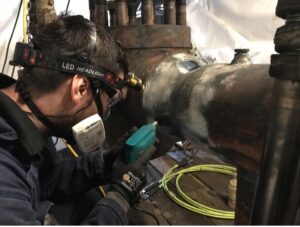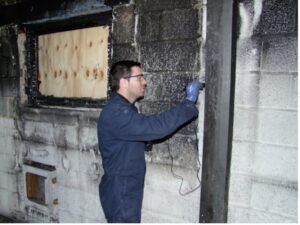Following completion of OPITO approved Basic Offshore Safety Induction and Emergency Training (BOSIET) R-TECH are now able to offer offshore metallurgical inspection support, including metallographic replication in addition to hardness testing and material identification.


Onsite metallurgical replication is an adaptable tool that can be used for the identification and characterisation of a wide range of metallurgical degradation mechanisms and defects. In essence this technique enables a carbon copy of the underlying material microstructure, without requiring the removal of a physical sample. The technique can characterise the underlying microstructure of various metals i.e. carbon steel, alloy steel, stainless steel (duplex, austenitic, ferritic, martensitic and precipitation hardened), nickel-based alloys and so on, enabling an assessment of any material degradation. In the context of high temperature plant, this technique is commonly used to identify carbide degradation and creep damage within carbon and low alloy steels. The technique is also valuable for characterising defects/cracks in-situ; examining the crack morphology i.e. whether it has propagated in a transgranular or intergranular manner, whether the cracking is associated with a deposit and whether the surrounding microstructure differs to bulk microstructure. These observations can then assist with understanding the cause of a particular defect or crack.
Hardness testing can provide a quick and relatively non-invasive measurement of the mechanical properties of a variety of materials. Portable hardness testing can be undertaken in-situ as part of a condition assessment of various components, without requiring the removal of a physical sample. For example, it can assist with determining the presence of localised differences in hardness associated with cracks or defects. It can also help to identify the presence of alpha prime in duplex stainless steel which leads to embrittlement. Hardness testing can also provide an indication of loss of strength in carbon/low alloy steels due to the microstructural changes which occur upon exposure to elevated temperature. Filings of a component can also be taken to obtain a fully quantitative chemical composition to verify the material grade.
The output of metallographic replication and portable hardness testing can be utilised to determine the useful remaining life of critical equipment, and as such it bears significant influence upon plant safety, the continuity of plant operations and capital investment decisions.
For more information, please contact us at info@r-techmaterials.com.